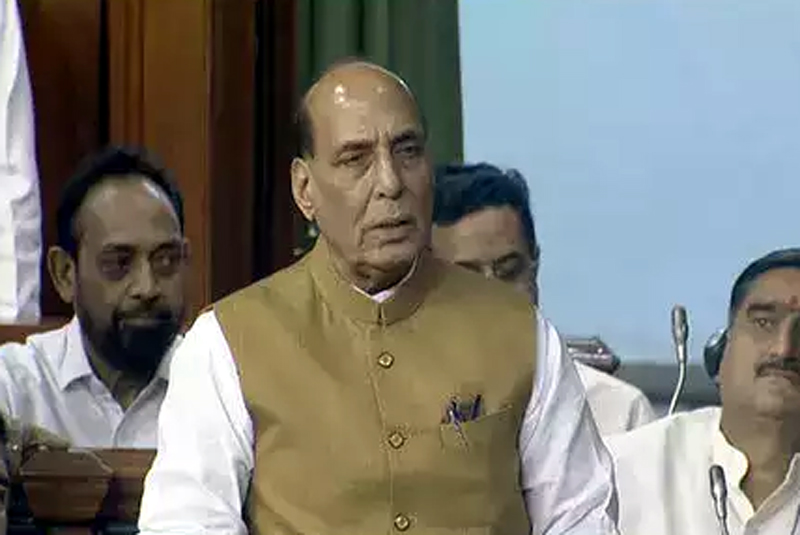Lok Sabha nod to Inter-Services Orgn Bill
*Prez gets powers of IIMS’ management accountability
NEW DELHI, Aug 4:
The Lok Sabha today approved a Bill which seeks to empower the Commander-in-Chief and Officer-in-Command of Inter-Services Organisations with disciplinary and administrative powers over personnel from other forces serving in such establishments.
Moving the Bill for consideration and passage, Defence Minister Rajnath Singh said the Inter-Services Organisations (Command, Control and Discipline) Bill is part of a series of steps being taken by the Government to strengthen the armed forces.
Amid slogan shouting by opposition members who were also displaying placards, Singh took the permission of the Chair to speak from one of the seats in the back benches.
A Parliamentary Panel had recently recommended that the Bill be passed without any amendments.
In his brief remarks, Singh said that as of now, personnel of the Army, Navy and the Air Force are governed in accordance with the provisions contained in their specific service Acts — the Army Act, 1950, the Navy Act, 1957, and the Air Force Act, 1950.
At the time of enactment of these respective Acts, most of the service organisations were largely comprised of personnel from a single service — either Army, Navy or Air Force. However, now there are numerous inter-services organisations where personnel of the armed forces and other forces serve together.
Currently, the commander-in-chief or officer-in-command of the inter-services organisations is not empowered to exercise disciplinary or administrative powers over the personnel belonging to other services.
Only officers of the respective services are empowered to exercise disciplinary powers over the service personnel under their respective Service Acts, the Minister noted.
The officers serving in these organisations need to be reverted to their respective parent service units for exercising any disciplinary or administrative action which results in delays.
The Bill was later passed after a brief discussion.
Meanwhile, the Lok Sabha today passed a Bill seeking to entrust the management accountability of the IIMs with the President, who will be a Visitor and have powers to audit their functioning, remove directors and nominate a member in the selection committee.
Piloting the Indian Institutes of Management (Amendment) Bill, 2023, in the Lower House, Education Minister Dharmendra Pradhan said the government has no intention to take away the academic accountability from the institute but the Bill will only ensure its management accountability as the Centre has spent over Rs 6,000 crore in setting up the IIMs.
Under the existing dispensation, the President of India is also a visitor at IITs and NITs, but no questions are being raised on the academic autonomy of these institutes, Pradhan said.
The Bill, which was introduced on July 28, was passed by the Lower House by a voice vote amid disruptions by opposition members over the recent violence in Manipur.
According to the Bill, which seeks to amend the IIM Act of 2017, the President will be a Visitor to the Indian Institutes of Management (IIMs) with powers to audit their functioning, order probes and appoint as well as remove directors.
“The Visitor may appoint one or more persons to review the work and progress of any institute, to hold enquiries into affairs thereof and to report in such manner as the Visitor may direct. The board may also recommend to the Visitor an enquiry as deemed proper against the institute which has not been functioning in accordance with provisions and objectives of the Act,” it stated.
Under the IIM Act, which came into force in January 2018 and granted the premier B-schools greater autonomy, the board of governors of each institute has 19 members which includes just one representative each from the central and State Governments.
The board nominates its remaining 17 members from among eminent personalities, faculty and alumni. It also appoints the search panels for the appointment of new directors and chairpersons, and later, makes the appointments if it agrees with the search panels’ recommendations.
However, according to the amendment Bill, the search-cum-selection panel for the Director’s appointment will have a Visitor’s nominee. (PTI)


